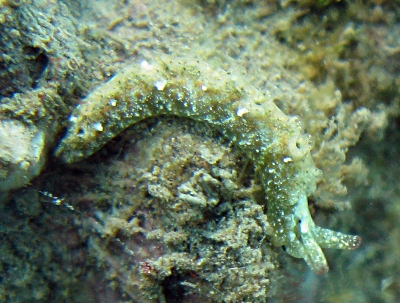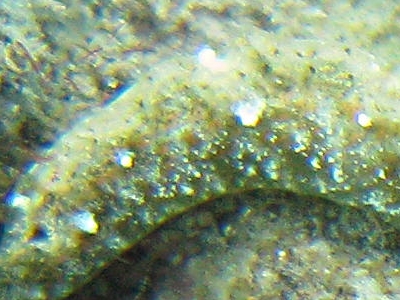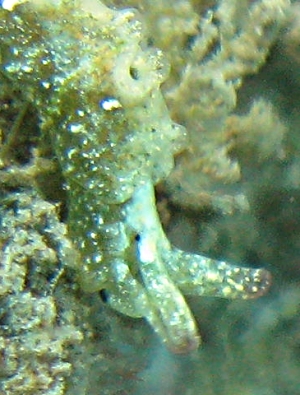Elysia spp
Miscellaneous unidentified species
Order: SACOGLOSSA
Superfamily: ELYSIOIDEA
Family: Elysiidae
Rudman, W.B., 2006 (November 6) Elysia spp Miscellaneous unidentified species. [In] Sea Slug Forum. Australian Museum, Sydney. Available from http://www.seaslugforum.net/find/elysiaspp
Related messages
Re: Thuridilla kathae? from Reunion Is.
February 17, 2009
From: Kathe R. Jensen
Concerning message #22211:
Dear Sully and Bill,
I am reluctant to identify this species as a Thuridilla. Few species of Thuridilla have papillose bodies, and when they do (as in T. albopustulata or T. flavomaculata) the papillae are usually distinctly demarcated, not fuzzy as in this species. Also, the rhinophores appear "wrong" somehow. Thuridilla has relatively large rhinophores almost meeting at the bases and distinctly rolled. With a length of 15 mm this one is not a juvenile, which might have smaller, grooved rhinophores. Rather I think this is an Elysia, but I don't want to put a species name on it.
Best wishes,
Kathe
krjensen@snm.ku.dk
Jensen, K.R., 2009 (Feb 17) Re: Thuridilla kathae? from Reunion Is.. [Message in] Sea Slug Forum. Australian Museum, Sydney. Available from http://www.seaslugforum.net/find/22237Dear Kathe,
I understand your reluctance. Clearly there is still quite a bit of work needed on Elysia and Thuridilla.
Best wishes,
Bill Rudman
Re: Thuridilla kathae? from Reunion Is.
February 6, 2009
From: Sully Bachel


Concerning message #3828:
Dear Bill
My wife Monika found this nudibranch on a sandy rock. It was quite difficult to see it because of the colour and its small size.
It is probably a Thuridilla or a Elysia.
What is your opinion
Locality: La Possession, 6 m, Reunion Island, Indian Ocean, 28 December 2008. Length: 15 mm. Photographer: Sully Bachel.
Thanks for your identification
best regards
Sully Bachel
s.bachel@orange.fr
Bachel, S., 2009 (Feb 6) Re: Thuridilla kathae? from Reunion Is.. [Message in] Sea Slug Forum. Australian Museum, Sydney. Available from http://www.seaslugforum.net/find/22211
Dear Sully,
It is certainly and Elysia or a Thuridilla. One way the genera can be distinguished externally - in most cases - is that in Thuridilla there is usually a bright colour pattern, the pigments being quite opaque, while in Elysia, there may be colourful markings but the background colour is usually translucent with the green of the branching internal digestive gland showing through. Certainly the row of raised white spots along each side of the parapodia are similar to Thuridlla kathae, the translucent body through which we can see green digestive gland branching, is unusual.
I would be grateful for some guidance from Kathe Jensen or Terry Gosliner
Best wishes,
Bill Rudman
Elysia from nthn New South Wales
November 8, 2006
From: Roxanne Fea.

Dear Bill,
We also found this species in Hugo's Trench at Julian Rocks last week and are unable to ID it. Do you have any suggestions?
Locality: Hugo's Trench, Julian Rocks, 10m, nthn New South Wales, Asutralia, Tasman Sea, 22 August 2006, Sheer walls. Length: 20 mm. Photographer: Roxanne Fea.
Looking forward to your response;
Roxanne Fea & Jason Coombs
bungysheep@hotmail.com


Dear Roxanne & Jason,
This is a pretty distinctive looking species of Elysia. It almost looks as though it may be related to the species of Pattyclaya, such as P. brycei, which have evolved lateral flaps across the inside of the parapodia. I don't recognise the species, but someone may be able to suggest a name
Best wishes,
Bill Rudman
